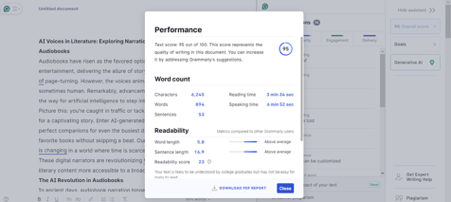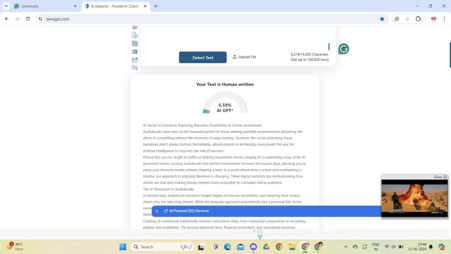AI Voices in Literature: Exploring Narration Possibilities in Online Audiobooks

Audiobooks have risen as the favored option for those seeking portable entertainment, delivering the allure of storytelling without the necessity of page-turning. However, the voices animating these narratives are only sometimes human. Remarkably, advancements in technology have paved the way for artificial intelligence to step into the role of narrator. Picture this: you're caught in traffic or tackling household chores, longing for a captivating story. Enter AI-generated voices, making audiobooks perfect companions for even the busiest days, allowing you to enjoy your favorite books without skipping a beat. Our approach to enjoying literature is changing in a world where time is scarce, and multitasking is routine. These digital narrators are revolutionizing how stories are told and making literary content more accessible to a broader online audience.
The AI Revolution in Audiobooks In ancient days, audiobook narration hinged largely on human storytellers, each weaving their unique charm into the tales they shared. While this bespoke approach undoubtedly lent a personal flair to the narratives, it also brought challenges. Recording sessions often dragged on, costing time and money, and finding the perfect narrator for a given book took a lot of work. Creating an audiobook traditionally involves meticulous steps, from manuscript preparation to recording, editing, and publishing. The process demands time, financial investment, and specialized expertise. At the outset, manuscript preparation lays the groundwork for the audiobook. A meticulously edited and proofread manuscript is paramount, ensuring seamless alignment with the printed version to guarantee an uninterrupted experience for readers who may choose to follow along.
Exploring Audiobook Narration Recording the audiobook narration is a pivotal phase, whether entrusting the task to professional voice actors or undertaking the narration oneself. Establishing an optimal recording environment and investing in top-notch recording equipment are indispensable for self-narration, ensuring the creation of a final product of exceptional quality. The emergence of AI voice generators represents a groundbreaking advancement in audiobooks. These sophisticated programs can read text aloud in voices resembling human speech. Publishers now have access to many synthetic voices that can read text with remarkable accuracy. These voices can be customized to suit the tone and style of the book and have complex algorithms. These systems craft voices that can express a wide range of emotions and tones, enhancing the immersive experience for listeners and offering consistency and flexibility like never before.
Shaping Narration in Audiobooks AI voice generators bring stories to life and make reading easier for everyone, especially those with visual impairments or reading difficulties. This is the process of online text to speech. Based on the text version of your book, it can quickly transform your written content into audio files for a fraction of what it costs to rent a studio. With a simple click, digital text turns into spoken word, making books and articles accessible in a whole new way, allowing authors and publishers to reach a wider audience. The audiobook market could experience a surge in new releases, catering to a wider range of listeners with a richer tapestry of choices, from obscure literary gems to the latest self-published sensations. These tools also offer a personal touch, allowing users to select their preferred voice, accent, and speed. Imagine being able to tailor your audiobook experience just the way you like it.
Accelerating Audiobook Creation The audiobook creation process could be significantly accelerated with the help of AI. This empowers authors to get their works into the eager ears of listeners much faster, capitalizing on the momentum surrounding a new release. These advancements not only increase accessibility but also add a personal touch to the reading experience, making it more enjoyable for all. From a practical standpoint, AI-generated voices offer significant advantages over human narrators. Recording sessions are no longer necessary, saving time and money in production. For authors who are self-published or grappling with limited financial resources, AI narration presents a game-changer. It makes audiobooks a more realistic financial prospect, allowing them to amplify their reach without burning a hole in their pockets, leveling the playing field in the competitive publishing world.
Considering Challenges While the advantages of utilizing AI-generated voices in narration are evident, it's crucial to acknowledge the associated concerns and obstacles. One significant worry is the perceived deficiency in emotional depth and subtlety compared to human narrators – a sentiment not entirely unfounded. Despite the remarkable progress in mimicking human speech, there remains a distinct quality to storytelling that only human narrators can truly embody. Moreover, as AI narration assumes a prominent role, ethical considerations come to the fore. Transparency becomes paramount, especially concerning the creation of synthetic voices that closely resemble real individuals, raising valid queries about consent and intellectual property rights.
The Future of AI Voices in Literature The future of AI voices in audiobooks promises even more lifelike narrations, addressing current limitations and enriching the listening experience. Beyond speeding up production, AI ensures greater accessibility and diversity in literature. Integrating AI with machine learning and natural language processing holds the potential for personalized audiobook experiences, adapting to readers' preferences and moods. In conclusion, AI-generated voices are revolutionizing the audiobook industry, offering consistent, customizable, and accessible narration solutions. From AI voice generators to online text-to-speech technologies, literature has become more accessible and affordable, benefiting creators and consumers. Remember the human touch that makes storytelling powerful as we embrace these innovations.

